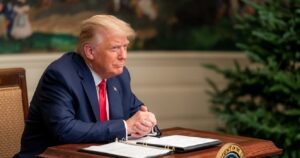Supreme Court backs Trump on $4 billion foreign aid hold
Hold onto your hats, folks—the Supreme Court just handed the Trump administration a major win by allowing it to keep $4 billion in foreign aid on ice.
In a nutshell, the justices temporarily blocked a lower court’s order to release the funds, siding with the Executive Branch while legal battles over presidential power and congressional authority rage on.
This saga kicked off when U.S. District Judge Amir Ali, a Biden appointee, ordered the administration to disburse the funds earlier this month, setting a tight deadline.
Supreme Court Steps In Decisively
The Trump team wasn’t having it, arguing that such a mandate was a “grave and urgent threat” to the separation of powers.
Enter the Supreme Court on Friday, with a ruling that put the brakes on Judge Ali’s order, reasoning that harm to foreign policy outweighed any downside for the funds’ recipients.
As the Court put it, “harms to the Executive’s conduct” in global affairs took precedence—a polite way of saying the President’s turf matters more right now.
Legal Limbo for Foreign Aid Funds
But don’t mistake this for a final verdict; the justices made clear their order is just a placeholder while the deeper issues get hashed out.
Still, the impact is real—Congress appropriated this $4 billion for foreign aid, and now it’s stuck in limbo, likely never reaching those it was meant for.
Justice Elena Kagan, dissenting alongside Justices Sonia Sotomayor and Ketanji Brown Jackson, lamented that this ruling lets the Executive “cease obligating” funds Congress intended to spend.
Dissent Highlights Deeper Power Struggle
Kagan’s point stings for progressive advocates, but let’s be honest—when has Congress ever been shy about overreaching, only to cry foul when checked?
The Trump administration’s stance, echoed by Solicitor General John Sauer, is that rushing to spend this money would force unwanted diplomatic talks and congressional notifications the President flatly opposes.
Sauer warned that compliance would mean starting “diplomatic discussions” counterproductive to policy goals—a bureaucratic nightmare no one needs.
Balancing Power in a Tense Standoff
At its core, this dispute is a heavyweight bout between presidential prerogative and congressional purse strings, with the Supreme Court playing referee.
For conservatives wary of judicial overreach, this temporary win feels like a nod to executive authority, though the dissent’s “novel issues” warning suggests the fight is far from over.
And while empathy is due for those abroad awaiting aid, the reality is that American interests must come first—turns out, prioritizing our own backyard isn’t just rhetoric, it’s policy.




